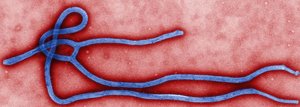Exxon Mobil Corp. announced on Friday that the Ebola outbreak has disrupted its offshore drilling plans in Liberia as well as other oil and gas activities in West Africa.
The Irving-based energy giant, which has operations in Liberia and Nigeria, has told several employees not to enter the countries that have been directly affected by Ebola virus disease.
Ebola virus disease (EVD), also known as Ebola hemorrhagic fever (EHF) or just Ebola, is a disease that affects humans and other primates when infected with the ebolavirus. Symptoms, which appear between two days and three weeks after becoming infected, include fever, muscle pain, and headaches. The patient typically develops vomiting and diarrhea, and then a skin rash. Liver and kidney function are also affected. The body eventually bleeds both internally and externally. Between 25% and 75% of patients die from the disease.
Human-to-human transmission of the ebolavirus occurs via direct contact with bodily fluids or blood from an infected person.
So far, the ebolavirus has killed more than 3,339 people in West Africa. A few days ago a person was diagnosed with Ebola in Dallas, Texas.
Exxon’s CEO, Rex Tillerson, said in a news conference that his company is taking precautionary measures related to employees’ families.
Mr. Tillerson said:
“We had some drilling plans for some blocks offshore West Africa in Liberia,” CEO Rex Tillerson told a news conference to announce $18 million in grants to three Houston hospitals. We are having to look at when it would be prudent to resume operations there because you do have to have shore-based support.”
Liberia is currently the worst affected country. Nigeria, Sierra Leone, Guinea and Senegal are also affected.
Mr. Tillerson said that Exxon’s current response has been “fairly low level.”
Children’s lives devastated
According to the United Nations Children’s Fund, about 3,700 children in the affected areas have lost at least one parent so far this year. Those numbers are forecast to double by mid-October.
UNICEF’s Regional Director for West & Central Africa, Manuel Fontaine said:
“Thousands of children are living through the deaths of their mother, father or family members from Ebola. These children urgently need special attention and support; yet many of them feel unwanted and even abandoned.”
Charity Save the Children says demand for treatment beds and medical staff is far outstripping supply in Sierra Leone, where 765 new cases were reported last week, i.e. five every hour.
Save the Children wrote:
“The critical shortage comes as untold numbers of children are dying anonymously at home or in the streets, meaning the scale of the problem is massively unreported.”

